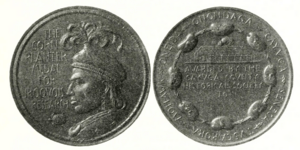Cornplanter Medal facts for kids
The Cornplanter Medal is a special award. It is named after the Iroquois chief Cornplanter. This medal honors people who have greatly helped us learn more about the Iroquois people. It was started by Frederick Starr, a professor from the University of Chicago. He was an anthropologist, someone who studies human cultures.
Professor Starr had two main reasons for creating the medal. First, he wanted to celebrate people who researched and shared knowledge about the Iroquois. Second, he wanted to show that the Iroquois people had amazing artists. He did this by sharing the art of a young Iroquois artist named Jesse Cornplanter.
The money for the medal came from selling a booklet. This booklet, called Iroquois Indian Games and Dances, was published around 1903. It featured sketches by "Jesse Cornplanter, Seneca Indian Boy."
Contents
What is the Cornplanter Medal?
The Cornplanter Medal is given to people who make important contributions. These contributions help us understand the Iroquois people better. The medal was first given out in 1904. The Cayuga County Historical Society in Auburn, New York, presented it.
Who can receive the award?
The medal is awarded every two years. People who receive it usually fit into one or more of these groups:
- Ethnologists: These are people who study cultures. They do important research among the Iroquois.
- Historians: These are people who study the past. They add new information to what we know about the Iroquois.
- Artists: These are people who create art. They show Iroquois life or people through paintings or sculptures.
- Philanthropists: These are people who give money or help to good causes. Their efforts are based on understanding the Iroquois' needs.
List of Medal Recipients
Here is a list of some people who have received the Cornplanter Medal:
- 1904 General John S. Clark, a historian and archaeologist
- 1906 Rev. William Martin Beauchamp, an archaeologist and ethnologist
- 1908 Dr. David Boyle, an archaeologist and ethnologist
- 1910 William P. Letchworth, a philanthropist
- 1912 Reuben Gold Thwaites, a historian
- 1914 J.N.B. Hewitt, an ethnologist
- 1916 Arthur C. Parker, an archaeologist and ethnologist
- 1919 Alvin H. Dewey, a philanthropist
- 1920 Mary Clark Thompson, a philanthropist
- 1923 Professor Frederick Houghton, an archaeologist
- 1926 Edwin H. Gohl, an archaeologist and artist
- 1965 William N. Fenton, an ethnologist and historian
- 1966 William A. Ritchie, an archaeologist
- 1967 Merle H. Deardorff, an ethnologist and historian
- 1968 Aldelphena Logan, an artist
- 1969 Kenneth E. Kidd, a historian and archaeologist
- 1970 Anthony F. C. Wallace, an ethnologist and historian
- 1971 Floyd G. Lounsbury, a linguist and ethnologist
- 1975 Marian E. White, an archaeologist and historian; and Walter K. Long, an artist
- 1977 Richard S. MacNeish, an archaeologist
- 1979 Bruce G. Trigger, a historian and archaeologist
See also
- List of archaeology awards
- List of history awards


